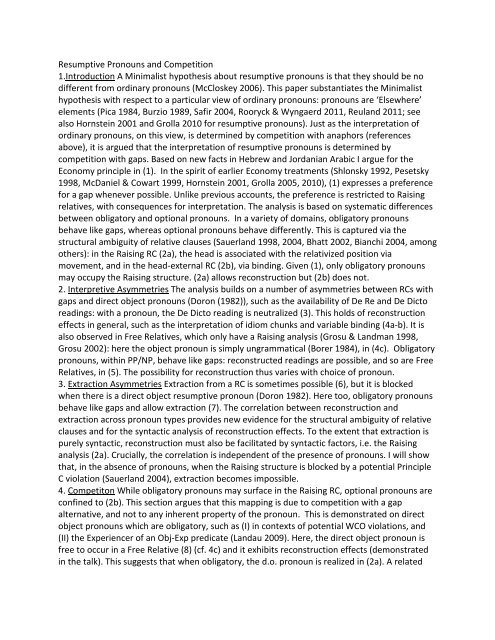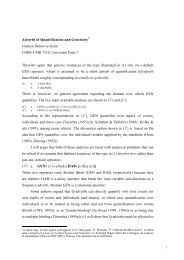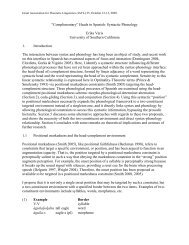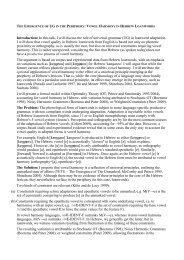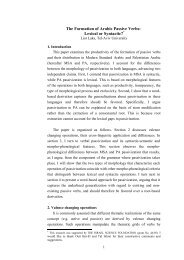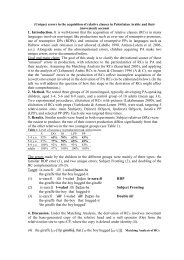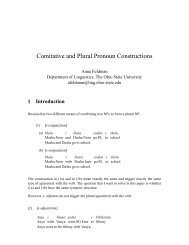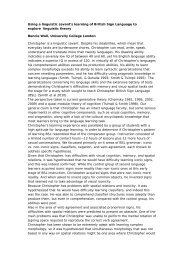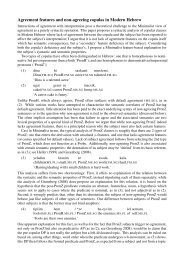Resumptive Pronouns and Competition 1.Introduction A Minimalist ...
Resumptive Pronouns and Competition 1.Introduction A Minimalist ...
Resumptive Pronouns and Competition 1.Introduction A Minimalist ...
Create successful ePaper yourself
Turn your PDF publications into a flip-book with our unique Google optimized e-Paper software.
<strong>Resumptive</strong> <strong>Pronouns</strong> <strong>and</strong> <strong>Competition</strong><strong>1.Introduction</strong> A <strong>Minimalist</strong> hypothesis about resumptive pronouns is that they should be nodifferent from ordinary pronouns (McCloskey 2006). This paper substantiates the <strong>Minimalist</strong>hypothesis with respect to a particular view of ordinary pronouns: pronouns are ‘Elsewhere’elements (Pica 1984, Burzio 1989, Safir 2004, Rooryck & Wyngaerd 2011, Reul<strong>and</strong> 2011; seealso Hornstein 2001 <strong>and</strong> Grolla 2010 for resumptive pronouns). Just as the interpretation ofordinary pronouns, on this view, is determined by competition with anaphors (referencesabove), it is argued that the interpretation of resumptive pronouns is determined bycompetition with gaps. Based on new facts in Hebrew <strong>and</strong> Jordanian Arabic I argue for theEconomy principle in (1). In the spirit of earlier Economy treatments (Shlonsky 1992, Pesetsky1998, McDaniel & Cowart 1999, Hornstein 2001, Grolla 2005, 2010), (1) expresses a preferencefor a gap whenever possible. Unlike previous accounts, the preference is restricted to Raisingrelatives, with consequences for interpretation. The analysis is based on systematic differencesbetween obligatory <strong>and</strong> optional pronouns. In a variety of domains, obligatory pronounsbehave like gaps, whereas optional pronouns behave differently. This is captured via thestructural ambiguity of relative clauses (Sauerl<strong>and</strong> 1998, 2004, Bhatt 2002, Bianchi 2004, amongothers): in the Raising RC (2a), the head is associated with the relativized position viamovement, <strong>and</strong> in the head-external RC (2b), via binding. Given (1), only obligatory pronounsmay occupy the Raising structure. (2a) allows reconstruction but (2b) does not.2. Interpretive Asymmetries The analysis builds on a number of asymmetries between RCs withgaps <strong>and</strong> direct object pronouns (Doron (1982)), such as the availability of De Re <strong>and</strong> De Dictoreadings: with a pronoun, the De Dicto reading is neutralized (3). This holds of reconstructioneffects in general, such as the interpretation of idiom chunks <strong>and</strong> variable binding (4a-b). It isalso observed in Free Relatives, which only have a Raising analysis (Grosu & L<strong>and</strong>man 1998,Grosu 2002): here the object pronoun is simply ungrammatical (Borer 1984), in (4c). Obligatorypronouns, within PP/NP, behave like gaps: reconstructed readings are possible, <strong>and</strong> so are FreeRelatives, in (5). The possibility for reconstruction thus varies with choice of pronoun.3. Extraction Asymmetries Extraction from a RC is sometimes possible (6), but it is blockedwhen there is a direct object resumptive pronoun (Doron 1982). Here too, obligatory pronounsbehave like gaps <strong>and</strong> allow extraction (7). The correlation between reconstruction <strong>and</strong>extraction across pronoun types provides new evidence for the structural ambiguity of relativeclauses <strong>and</strong> for the syntactic analysis of reconstruction effects. To the extent that extraction ispurely syntactic, reconstruction must also be facilitated by syntactic factors, i.e. the Raisinganalysis (2a). Crucially, the correlation is independent of the presence of pronouns. I will showthat, in the absence of pronouns, when the Raising structure is blocked by a potential PrincipleC violation (Sauerl<strong>and</strong> 2004), extraction becomes impossible.4. Competiton While obligatory pronouns may surface in the Raising RC, optional pronouns areconfined to (2b). This section argues that this mapping is due to competition with a gapalternative, <strong>and</strong> not to any inherent property of the pronoun. This is demonstrated on directobject pronouns which are obligatory, such as (I) in contexts of potential WCO violations, <strong>and</strong>(II) the Experiencer of an Obj-Exp predicate (L<strong>and</strong>au 2009). Here, the direct object pronoun isfree to occur in a Free Relative (8) (cf. 4c) <strong>and</strong> it exhibits reconstruction effects (demonstratedin the talk). This suggests that when obligatory, the d.o. pronoun is realized in (2a). A related
competiton-effect is observed in Jordanian Arabic (Malkawi 2009), <strong>and</strong> I will argue for a similartreatment in terms of (1) & (2).Examples:(1) The extraction site in a Raising relative is realized by the least specified form available.(2) a. Raising: b. Head-external structure:DPDP3 3D CP D NPthe 3 the 3NP C’ NP 1 CPbook 1 6 book 6that John read book 1 that John read it 1(3) dani yimca et [ha-iSa 1 Se-hu mexapes t 1 / ota 1 ] Only De Re with pronoundani will.find ACC the-woman that-he searches'Dani will find the woman he is looking for.'(4) a. [ha-tmuna Sel acmo] 1 [Se-kol gever haxi ohev (*ota 1 )] halxa le-ibudthe-picture of himself that-every man most likes it got lost'The picture of himself that every man likes the most got lost.'b. ha-xatul 1 Se-hocenu (oto 1 ) me-ha-sak Pronoun blocks idiomatic readingthe-cat that-we.removed it from-the-bag‘The cat that we pulled out of the bag’c. ze mi Se-pagaSti (*oto) be-hoduthis who that-met.I him in-india‘This is who I met in India.’(5) a. dani yimca et [ha-iSa 1 Se-hu xolem aleya 1 ] De Re <strong>and</strong> De Dictodani will.find ACC the-woman that-he dreams of-herb. [ha-tmuna Sel acmo] 1 [Se-kol gever hexlit aleya 1 ] halxa le-ibudThe-picture of-himself that-every man decided on-it got lostc. ha-ec 1 Se-hu tipes alav 1 Pronoun is compatible with Idiomatic readingthe-tree that-he climbed on-it'the high position that he took'(6) al lexem Saxor 2 , yeS [rak gvina axat 1 [Se-keday limroax t 1 / *ota 1 t 2 )]]on bread black is only cheese one that-worth to-spreading‘On black bread there is only one cheese that is worth spreading.’(7) im ha-baxur ha-ze 2 od lo macati [nose 1 PRO le-daber t 2 alav 1 ]with the-guy this, yet not found topic to-talk about-it'With this guy, I haven't yet found a topic to talk about.'(8) a. mi 1 Se-ha-horim Selo 1 metapxim *(oto 1 ) ba-yaldut macli’ax ba-bagrutwho that-the-parents of.him support him in-childhood succeeds in.the-adulthood‘Whoever is supported by his parents in childhood succeeds as an adult.’b. mi 2 Se-[margiz *(oto 2 ) [Se-[ha-harca’a be-anglit]]] Se-yecewho that-annoys him that-the-lecture in-english that-should.leave‘Whoever is annoyed that lecture is in English should leave.’


